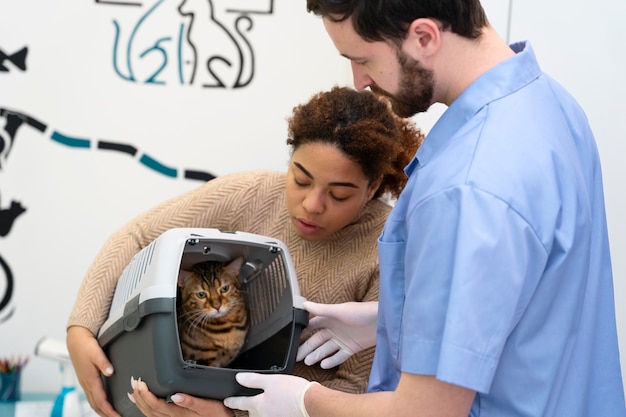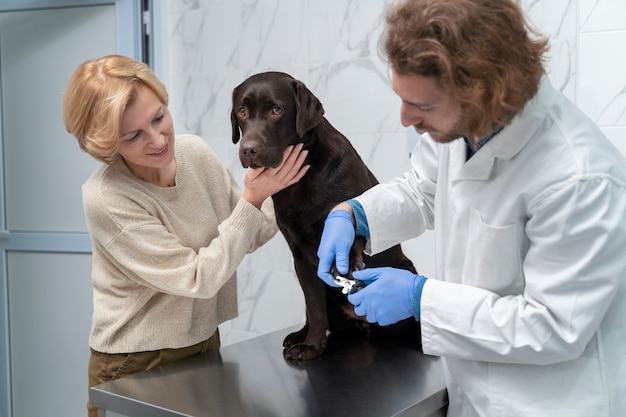When to See a Veterinary Oncologist for Your Pet’s Unusual Symptoms


When to See a Veterinary Oncologist for Your Pet’s Unusual Symptoms
Every pet owner knows their dog or cat better than anyone else. When you notice a new lump, a persistent limp, or changes in your pet’s appetite or energy, it’s natural to worry. While many of these changes may not be serious, some could be early cancer signs in dogs and cats that demand specialized attention. Recognizing when to seek out a veterinary oncologist is crucial for your pet’s health, and early intervention can make a significant difference in outcomes.
At Veterinary Cancer Health, located at 4101 Turtle Creek Drive, Coral Springs, FL, our team of veterinary oncology professionals is dedicated to providing advanced, compassionate cancer care for pets in Coral Springs and surrounding communities. This guide will help you understand which symptoms may signal the need for a consultation with a specialist, what to expect from cancer diagnostics, and how working with an oncology vet near me could benefit your beloved pet.
If you are searching for advanced cancer diagnostics in Coral Springs or want to know when to consult an oncology veterinarian near me, read on to learn more about what signs to watch for and the next steps to take for your dog or cat.
Recognizing Unusual Symptoms: When Should You Be Concerned?
Many symptoms of cancer in pets are subtle and can easily be mistaken for normal aging or minor health issues. However, certain changes require close attention and may warrant a timely referral to a veterinary oncologist. Key symptoms that could indicate cancer in dogs and cats include the development of new lumps or bumps, persistent swelling that does not resolve, unexplained weight loss, and ongoing lethargy or reduced interest in play. Additional warning signs are wounds that do not heal, changes in appetite or drinking habits, difficulty breathing, lameness that persists beyond a minor injury, and unexplained bleeding or discharge.
A scenario many pet owners experience occurs when a previously active dog begins to slow down and loses interest in walks, or a cat starts hiding more frequently and seems less engaged. While these behaviors can be related to many different conditions, they can also be early cancer signs in dogs and cats—especially if accompanied by other physical changes.
If you notice any combination of these symptoms and they persist for more than a few days, or if you feel a new mass under your pet’s skin, it is important to reach out to your primary veterinarian right away. Your general practitioner may recommend a referral to a specialist, where a veterinary oncology vet near me can provide a comprehensive evaluation and advanced diagnostics. For an overview of our approach to diagnosing cancer and determining the best treatment path, visit our page on comprehensive cancer diagnosis and staging.
Understanding Why Cancer Develops in Pets
Learning that your dog or cat might have cancer is an emotional experience. Understanding the underlying causes can help guide your next steps. Cancer in pets, as in humans, occurs when cells grow uncontrollably and develop into masses or spread to other parts of the body. While the exact reasons for cancer development are often unknown, factors such as age, genetics, environmental exposures, and certain viruses can increase risk.
Older pets are more likely to develop cancer, but it is not limited to senior animals. Some breeds, such as Golden Retrievers, Boxers, and Siamese cats, appear to have a higher genetic predisposition to certain tumors. Environmental factors, including exposure to tobacco smoke, certain chemicals, and even excessive sunlight, can contribute to the development of tumors in pets. Additionally, chronic inflammation or infections may sometimes increase cancer risk.
It is important to note that not every lump or bump is malignant, and many are benign, but only specialized diagnostic tools can provide clarity. This is where the expertise of a veterinary oncologist comes into play, as we use a combination of advanced imaging, cytology, and molecular analysis to distinguish between benign and malignant growths. For more information about how our veterinary oncology professionals in Coral Springs utilize biopsies and cytology, you can visit our biopsy and cytology services page.
What to Expect: Oncology Diagnostics and Treatment Options
When your primary veterinarian suspects cancer or if you are seeking a second opinion, a veterinary oncology vet near me will perform a thorough evaluation. This process typically begins with a detailed health history, physical examination, and targeted diagnostic tests designed to determine the type and stage of cancer. At Veterinary Cancer Health, we offer advanced cancer diagnostics in Coral Springs, including digital radiographs (X-rays), CT scans, ultrasounds, and bloodwork. These imaging and laboratory tools help us localize the tumor, assess its size, and check for spread to other organs.
Once we have gathered all necessary information, a customized treatment plan is developed. Treatment approaches involve chemotherapy, targeted therapy, immunotherapy, and, in some cases, electrochemotherapy. Chemotherapy for pets is specifically tailored to minimize side effects while maximizing quality of life, and many cats and dogs tolerate it much better than most owners expect. Targeted therapies focus on disrupting cancer growth at the molecular level, while immunotherapy aims to stimulate your pet’s own immune system to fight the disease. For pets experiencing discomfort or advanced disease, palliative care and pain management are essential parts of our services. Ongoing cancer care and monitoring are vital to track your pet’s response to treatment and make any necessary adjustments, ensuring the best possible comfort and outcome.
To learn more about our approach to ongoing cancer care and monitoring in Coral Springs, visit our cancer care and monitoring page, where we discuss how we manage side effects and maintain your pet’s quality of life.
Practical Steps for Pet Owners: Prevention and Early Detection
While not all cancers can be prevented, there are steps you can take to support your pet’s health and increase the likelihood of early detection. Regular wellness visits with your primary veterinarian are essential for catching subtle changes before they progress. During these visits, your veterinarian will perform a thorough physical exam, palpate for lumps or abnormalities, and discuss any changes in your pet’s behavior or appetite.
At home, remain vigilant for any unexplained symptoms or changes in your pet. Early warning signs, such as lumps that change in size or texture, sores that do not heal, or persistent coughing, should prompt a timely conversation with your veterinarian. Maintaining a healthy weight, providing a balanced diet, and minimizing exposure to known carcinogens like secondhand smoke or excessive sunlight can also help reduce risk. If your pet has a known predisposition to certain cancers, more frequent screening may be recommended.
For those seeking cancer diagnostics near me, working with a veterinary oncologist in Coral Springs ensures access to specialized tools and expertise that can make a critical difference in your pet’s outcome.
When to Seek Professional Oncology Care for Your Pet
Deciding when to consult a veterinary oncologist can feel overwhelming, especially if you are unsure whether your pet’s symptoms are significant. You should seek immediate veterinary attention if your pet displays rapidly growing masses, difficulty breathing, persistent vomiting or diarrhea, sudden weight loss, ongoing bleeding, or severe pain. These symptoms may require urgent stabilization and prompt referral.
For less urgent but persistent symptoms, such as a slowly enlarging lump or gradual changes in appetite or energy, your primary care veterinarian can guide you on whether a referral is needed. Veterinary oncology professionals like our team at Veterinary Cancer Health specialize in advanced diagnostics and cancer treatment, offering hope and options even in challenging circumstances.
If you are searching for an oncology vet near me or advanced cancer diagnostics in Coral Springs, do not hesitate to reach out. Timely intervention is key for the best possible outcome, and our veterinary team collaborates closely with your regular veterinarian to ensure a seamless, supportive experience for both you and your pet.
Compassionate Support and Next Steps
If you are concerned about new symptoms or changes in your dog or cat, you are not alone. The team of veterinary oncology professionals at Veterinary Cancer Health is dedicated to providing expert, compassionate care for pets and their families in Coral Springs and surrounding communities. Whether you are seeking a second opinion, advanced cancer diagnostics, or ongoing management, our goal is to help your pet enjoy the best quality of life possible.
To schedule a consultation or discuss your concerns, contact our clinic at (195) 459-28504 or visit us at 4101 Turtle Creek Drive, Coral Springs, FL. If you are looking for a trusted oncology vet near me or advanced cancer diagnostics in Coral Springs, our veterinary team is here to help. For additional information about our services and how we can support you, explore our resources on comprehensive cancer diagnosis and staging or ongoing cancer care and monitoring.
Remember, early detection and expert care are vital in managing cancer signs in dogs and cats. If you have any doubts or questions about your pet’s health, consulting a veterinary oncologist can provide peace of mind and the best path forward for your furry family member.
This article is for informational purposes only and should not replace a professional veterinary exam. Always consult your veterinarian if you have concerns about your pet’s health.

.png)















